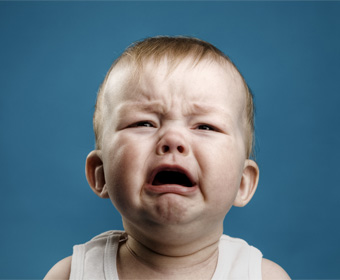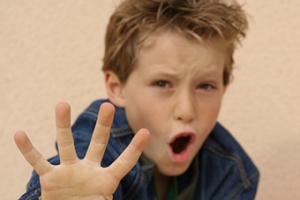Separation Anxiety - How You Can Help Your Child

Babies as young as six months old can show signs of separation anxiety. They might cry when a parent leaves the room and become very clingy - for most babies this is a normal phase. However for a few babies, separation anxiety goes on for years causing frustration and bewilderment for parents and carers.
There are various theories about why separation anxiety occurs, but the following explanation appears to be the one that most pediatric specialists agree upon.
In the sixteenth century all adults believed that if a ship sailed out of sight it would fall of the edge of the earth and be gone forever
A baby passes through many stages of development and at some point learns that a world exists outside of what it can see at any given moment. As adults we know that if our partner goes out of the front door they will be back. A baby has to learn this. So the red face, gut wrenching screams and tears are testimony to the baby’s instinctive distress at losing you forever.
Separation anxiety is commonly seen in babies from six to twelve months and then again at eighteen months, this is normal and usually passes as their understanding develops. But there are games that you can play to support their growing skills.
3 games to help to create understanding of a world outside of babies’ vision
-
Peek a boo. A timeless favourite that gently and playfully introduces the idea that people can disappear and be there again. Lay the baby on your lap facing you. With a soft cloth cover your face or the baby’s and then let it slide off - big smiles and the right noises are of course essential You can also do this by taking their legs and blocking their view of your face then opening them again so that they can see you.
-
Hide and seek. Lay your baby in the middle of a room where he can see you moving around. Then play Hide and seek behind sofas etc after you have hidden, talk to him or her, then show your face again. You can also put favourite toys out of sight and then find them together.
-
Practice what bye bye means. Say bye bye and wave then go out of sight and quickly come back.
A baby will often base its emotional reactions to new events on its parents’ reactions
If your reaction to your baby’s anxiety is more anxiety you deliver the message that this is a dangerous situation. So do your best to be calm and reassuring however your baby reacts.
For a few separation anxiety can persist well into childhood.
Children with separation anxiety can show a range of behaviours because of their unrealistic worries
-
Refusal to sleep or be alone
-
Clinginess
-
Huge tantrums at the thought of or actually being parted from the parent
-
Refusal to go to school
-
General disruptive behavior
-
Physical illness
-
Claiming that they are sick
-
Worry that some harm will come to them or their loved ones
7 tips for children with separation anxiety
-
Diet is all important for a child’s emotional and physical well being so give them a balanced diet without additives and chemicals.
-
When you have to leave them, explain when you will be back and talk about things that you will be doing while you are away.
-
Keep calm and rational however they react.
-
Concentrate on what is going well for them at school and at home.
-
See article on children and anxiety.
-
Make sure that your child does not have problems at school or has unrealistic beliefs that make him or her worried.
-
Address these beliefs when he or she is calm, an anxious brain can not take in rational information.
4 tips for parents
-
Spend quality time with your partner and ban talk about the children. Make a specific time to talk about your child, and set about making a plan of action rather just talking about the problems.
-
Don’t blame yourself or each other, it won’t help you
-
Get help from a cognitive behavioural therapist who specialises in children.
Dealing with children who are going through a period of separation anxiety can be draining. It is easy for a doting parent to be all consumed by their child’s worrying behaviour. Remaining clear and calm, while your child learns that he can be apart from you and be safe, will make that process or resolving separation anxiety easier.
An immediate antidote to anxiety is deep relaxation. We have a range of hypnosis sessions for children here and more general self hypnosis for anxiety here.



